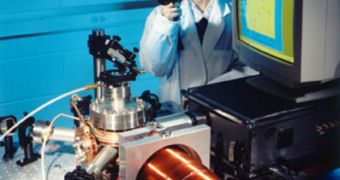When Albert Einstein proposed his now-famous Theory on General Relativity, the world of physics entered a frenzy that many say has yet to quell. The science that was proposed at the time suggested simple correlations, but in a way that carried tremendous implications for how our Universe is organized, and how it functions. Since then, physicists have been working hard at finding evidence to prove or infirm the TGR, with various degrees a success. A new study managed to discover that one of the pillars on which the theory is mounted is actually very solid.
The investigation, which was conducted at the University of California in Berkeley (UCB), looked at the slight differences that appeared in the tick of two separate quantum clocks, and found no indication that Einstein was wrong. The same conclusion had been achieved before, but now the research was conducted at a level of precision some 10,000 times more accurate than ever before. It was meant to assess the accuracy of one of the TGR's most advanced predictions, which states that clocks in stronger gravitational fields run more slowly.
This has been demonstrated over the past few decades on several occasions. Scientists flew clocks to higher and higher altitudes, until one was eventually sent into space using a rocket. No one managed to infirm the idea underlying Einstein's prediction. In the new study, the UCB team looked at the time-shifting effects of gravity with a mind-boggling degree of precision. Team leader Holger Muller says that the conclusions show time can be related to the effects of gravity up to 7 parts per billion. The work was conducted using nothing more than two tabletop, laboratory clocks, one of which was only one millimeter taller than the other.
“Precision experiments on a tabletop are not something of the past,” Muller says. “What's fascinating about their work is that they were using the entire atom as a clock,” says Joint Institute for Laboratory Astrophysics atomic-clock expert Jun Ye. The UCB team also included Humboldt University of Berlin scientist Achim Peters, as well as physicist Steven Chu, who is currently the Secretary of Energy in the United States. The official is the former director of the Department of Energy's Lawrence Berkeley National Laboratory, in California, Nature News reports.

 14 DAY TRIAL //
14 DAY TRIAL //